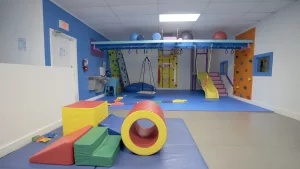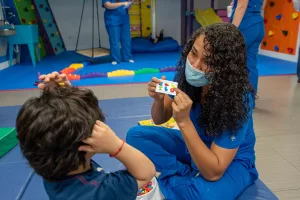What is Occupational Therapy?
Occupational therapy assists infants, toddlers, children, adolescents, and adults to develop the necessary skills through everyday life activities (referred to as occupations) in order to enable participation in their roles, habits, routines, school, community, and workplace.
Also, occupational therapists promote independence in their main occupations of daily living including activities of daily living (e.g., getting dressed, eating, bathing, toileting, transferring), instrumental activities of daily living (e.g., care of others, care of pets, financial management, etc), play, leisure, sleep, education, social participation, and work.

Some of the areas that occupational therapy specializes in are:
- Fine Motor/Bilateral Coordination Skills
- Gross Motor Skills
- Activities of Daily Living (ADL)/Self Care Skills
- Executive Function/Attention Skills
- Social/Pragmatic Skills
- Handwriting Skills
- Visual Motor/Visual Perceptual Skills
- Sensory Integration/Motor Planning
- Self Regulation Skills
- Cognitive Skills
- Play Skills
Some of the benefits of occupational therapy include:
- Improvement in fine motor skills
- Improvement in feeding, dressing, and hygiene skills
- Improvement in visual motor/ perceptual skills
- Regulation of arousal levels for participation in functional activities
- Increased socialization, organizational skills, and self confidence
- Development of a sensory diet
- Improvement in sensory processing
How do we become exceptional Occupational Therapists?
Occupational therapists, as defined by the National Board for Certification in Occupational Therapy (NBCOT), are professionals who receive the Registered Occupational Therapist OTR certification, which requires Level I Fieldwork, Level II Fieldwork, and requires a master’s or doctoral degree in Occupational Therapy from an ACOTE®-accredited occupational therapy (OT) program.

Who can Occupational Therapists work with?
Children that may benefit from occupational therapy have may or may not have the following diagnoses that would include, but are not limited to:
- Handwriting difficulties
- Sensory Integrative Dysfunction
- ADD/ADHD
- Autism Spectrum Disorder/Asperger’s
- Cerebral Palsy
- Fine motor delays
- Sensory Processing Disorder
- Down Syndrome
- Spinal cord injuries
- Handwriting difficulties
- Sensory Integrative Dysfunction
- ADD/ADHD
- Autism Spectrum Disorder/Asperger’s
- Cerebral Palsy
- Fine motor delays
- Sensory Processing Disorder
- Down Syndrome
- Spinal cord injuries
- Hypotonia
- Brachial Plexus injury
- Coordination difficulties
- Congenital abnormalities
- Limited independence with self care skills
- Genetic disorders
- Traumatic brain injury
- Developmental delay
- Handwriting difficulties
- Sensory Integrative Dysfunction
- ADD/ADHD
- Autism Spectrum Disorder/Asperger’s
- Cerebral Palsy
- Fine motor delays
- Sensory Processing Disorder
- Down Syndrome
- Spinal cord injuries
Contact Us
If you have any questions about speech therapy in Miami or Doral, Florida or would like to book an appointment for speech therapy, please call Exceptional Speech Therapy at 786.717.5649 or fill out the form below.
Myofunctional Therapy for Speech and Swallowing Disorders
Speech and swallowing disorders can significantly impact an individual's quality of life, affecting their ability to communicate effectively and enjoy meals without difficulty. While traditional therapies have long been used to address these challenges, a relatively newer approach, myofunctional therapy, [...]
What is “Scripting”? : A Guide for Parents of Kids with Autism Spectrum Disorder
Scripts are a superpower for kids with Autism Spectrum Disorder (ASD)! Let's dive into the wonderful world of scripting, what it is, and how parents can navigate this unique communication style with ease. What is Scripting? Imagine having your own [...]
5 Creative Ways to Wean Your Child off the Pacifier
Ah, the beloved pacifier – the magical tool that soothes fussy babies and saves parents from countless sleepless nights. But, there comes a time when the binky must go, as it can impact a child's oral development, sleep habits, and [...]



